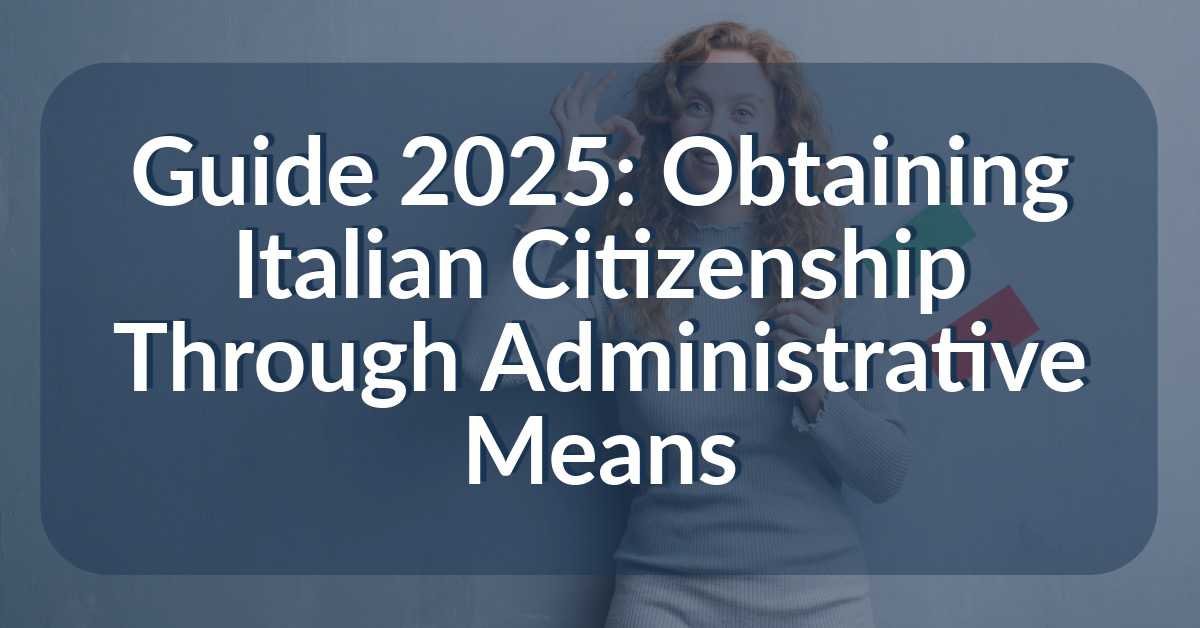Guide 2025: Obtaining Italian Citizenship Through Administrative Means
Are you a foreign citizen interested in obtaining Italian citizenship through the administrative process? Perfect, you are in the right place! In this brief guide, we will outline the methods and key steps to achieve your goal.
What is meant by Italian citizenship?
Italian citizenship is a legal bond between an individual and the State, which the legal system associates with the full exercise of civil and political rights.
The normative reference for acquiring Italian citizenship is law no. 91 of 1992.
According to this law, those whose parents (even one) are Italian citizens automatically obtain Italian citizenship at birth (L. 91/1992, Article 1, paragraph 1, letter a)): this is known as the principle of “jus sanguinis”.
Who We Are
We are an Italian law firm focused on assisting international clients with legal matters governed by Italian law. We provide strategic legal guidance, clear communication, and professional representation in cross-border cases. Learn more about us.
By proceeding, you confirm that you have read and agree to our privacy policy.
Moreover, the Italian system also recognizes the alternative of “jus soli”, although it is provided only in residual circumstances and for limited cases:
- People born in Italy whose parents’ status is considered unknown or stateless (i.e., without citizenship) (Art. 1, paragraph 1, letter b));
- People born in Italy who cannot acquire their parents’ citizenship because the law of the parents’ country of origin excludes that children born abroad can obtain their citizenship (Art. 1, paragraph 1, letter b));
- Children of unknown parents found (after abandonment) in Italy, for whom it is not possible to prove, by any interested party, possession of another citizenship (Art. 1, paragraph 2).
First of all, remember the important advantages that Italian citizenship offers.
Certainly, obtaining Italian citizenship offers important advantages. Firstly, equality before the law is guaranteed under Article 3 of the Italian Constitution:
“All citizens have equal social dignity and are equal before the law, without distinction of sex, race, language, religion, political opinions, personal and social conditions. It is the duty of the Republic to remove economic and social obstacles that, by limiting the freedom and equality of citizens, prevent the full development of the human person and the effective participation of all workers in the political, economic, and social organization of the country.”
Additionally, it guarantees civil rights, the Italian passport (which facilitates international travel due to its “strength”), freedom of movement and residence within EU countries, public services, and consular protection. For more information on the advantages, we invite you to read our article on the subject.
However, it is also important to consider the responsibilities associated with Italian citizenship, such as fulfilling tax obligations and respecting Italian laws. Additionally, Italian citizenship can have implications on the social and economic status of the applicant and their family, including labor rights and participation in the country’s political life.
Now let’s analyze Italian citizenship through administrative means.
What are the ways to apply for Italian citizenship iure sanguinis through administrative means?
The request for Italian citizenship jure sanguinis through administrative procedure can be made in two distinct ways:
- Through the Italian Consulate in the applicant’s country of origin if the applicant resides abroad;
- Directly in Italy, by submitting the application to the Mayor of the municipality of residence if the applicant resides in Italy.
In addition to submitting the application through the Italian Consulate or the Mayor of the municipality of residence, it is important to understand the documents required to support the application. These documents may include birth certificates, marriage certificates, and other documents that attest to Italian descent and the continuity of citizenship through generations. Once the application is submitted, the competent authorities will evaluate the documentation and conduct an investigation to verify the applicant’s eligibility.
Focusing on the first option, i.e., through the Italian Consulate in the applicant’s country of origin:
The first option presents the serious disadvantage of long waiting times.
For example, in South America, where many descendants of Italians are interested in obtaining Italian citizenship, consulates take too long to complete the process. The delays are significant due to the limitations of resources and personnel of the Italian Administration, which effectively discourages those interested in starting the process through their Consulate.
In Brazil, the waiting times at the Consulate for obtaining Italian citizenship can reach up to 10 years.
Regarding the procedures for recognizing Italian citizenship jure sanguinis, they are detailed in the circular no. K.28.1 of April 8, 1991, of the Ministry of the Interior, whose legal validity has not been affected by the subsequent entry into force of law no. 91/1992.
As mentioned, the authority responsible for conducting the investigation is designated based on the place of residence: for residents abroad, the competent consular office of the territory is in charge.
The recognition procedure involves the following steps:
- Verify that the descent originates from an Italian ancestor (with no generational limits);
- Ensure that the Italian citizen ancestor maintained citizenship until the birth of the descendant. The lack of naturalization or the date of any naturalization of the ancestor must be documented by a certificate issued by the competent foreign authority;
- Confirm the descent from the Italian ancestor through civil status documents of birth and marriage, legalized if necessary, and officially translated. It is important to note that Italian citizenship can also be transmitted maternally only for children born after January 1, 1948, the date of the Constitution’s entry into force;
- Demonstrate that neither the applicant nor their ancestors have renounced Italian citizenship, thus interrupting the chain of transmission of citizenship, through specific certificates issued by the competent Italian diplomatic-consular authorities.
The applicant is responsible for submitting the application with the prescribed, regular, and complete documentation to demonstrate the aforementioned requirements.
The application must be submitted to the competent consular office in the territory where the foreigner of Italian origin resides.
If there are incorrect information such as names, surnames, dates of birth, or other discrepancies in official documents, the Foreign Authority is responsible for the correction. For more information on this issue, you can consult our article on the topic: (the problem of names and surnames).
Conclusions
Considering the delicate procedure to follow and the search for documents to be submitted, the assistance of our Italian lawyer expert in Italian citizenship could be the solution to your problem. Do not hesitate to request a consultation.
Dott.ssa Laura Catanese
What we do
Explore our legal services for international clients under Italian law.
Start Here
Essential guides for international clients dealing with Italian law.








